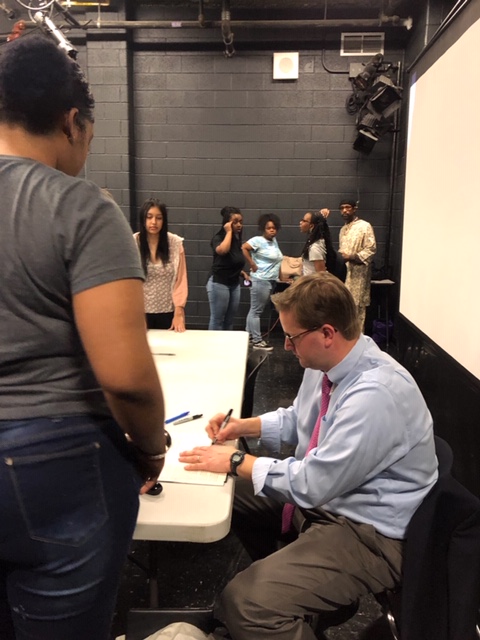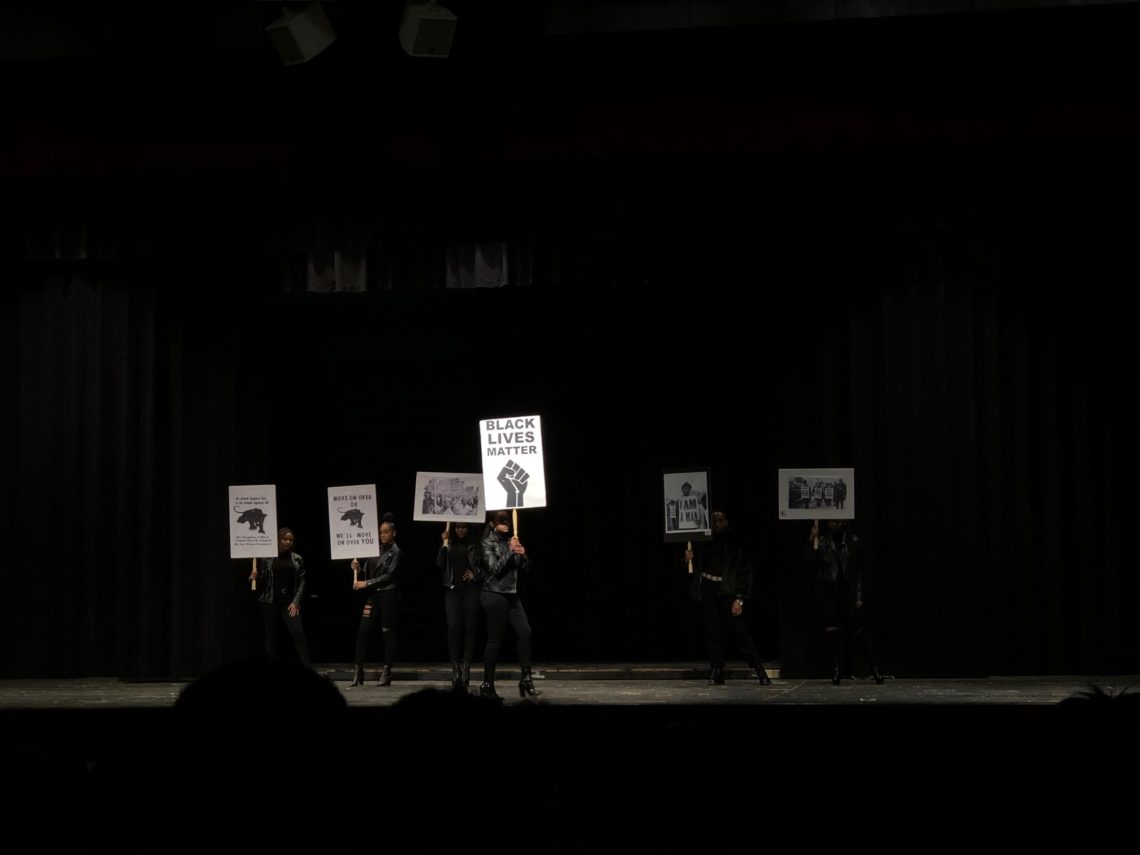A Retrospection of Activism in Athletics
Maria Areyan Hernandez, Lauren Larsen, and Bridgette Adu-Wadier
“What unites us is greater than what divides us,” said Ra Alim Shabazz, Chairman of the Black History Month Committee at T.C. Williams and Honors Government teacher. This year, the Black History Month Committee organized several events to celebrate black history and raise awareness about the issues African Americans face every day.
“We are looking for a cross section of parents, students, all the community stakeholders, administrators, and the people [that] really support T.C. Williams and could really benefit from this type of exposure,” said Shabazz. “Alexandria City is the perfect place to support this kind of endeavor.”
T.C. Drama Department Director Leslie Jones was in charge of the Entertainment Logistics Team, which organized the speakers, dates and times of the lectures and assembly. “My goal is to expose as many students at T.C. Williams High School to the different nuances of the African American experience throughout the performing arts.”
The Black History Month Committee organized the assemblies and lectures that guest speakers and T.C. students gave.
“We [organized] lecture series because the vision for our Black History Month program [is] an opportunity [for students] to interact with the history, to be able to ask questions [and do] that in a more intimate environment,” said Shabazz.
Members of the committee also included T.C. teachers Catherine Lewis, Aaron S. Hippolyte, Kyra E. Walker, administrator Cheryl J. Mills, and the Black Student Union students.
Among the guest speakers were Brian W. Stolarz, Dr. Billie Dee Tate, Dr. Omari H. Swinton, members of the T.C. Chapter of the National Society of Black Engineers, Jr. — an organization dedicated towards increasing diversity in STEM careers — as well as students Lorraine Johnson and Annaya Santos.
This year’s theme was “A Retrospection of Activism in Athletics: Using Athletic Platforms for Social Change Through the Ages”. The guest speaker was John Carlos, a legendary Olympic track runner whose raised fist on the podium of the 1968 Mexico City Olympics caused a social movement that would last for decades.
“He went through a lot of trials and turbulations as a result of him protesting the injustice that was happening during the civil rights era,” said Shabazz, “[This is] the 50th anniversary [of that Olympics]. It is important to really talk about [Carlos’] activism in athletics. We think it is very timely given his protests in 1968 and Colin Kaepernick taking a knee.”
John Carlos shared his experiences as an African American athlete dealing with racism during the Civil Rights Movement.
Carlos is the son of two Cuban immigrants and was born in Harlem, New York. In his speech, he recalled the time when he asked his father about the Olympics. Enthusiastic about what the competition entailed, Carlos told his dad he wanted to be an Olympic swimmer, but his father replied, “They won’t allow you to train with the white kids because you are a black kid.”

Carlos also spoke about his childhood, racist encounters while growing up, and his first time traveling internationally. “Crystal water… I fell in love with that place… everybody was black,” said Carlos sharing his experience of visiting Trinidad and Tobago.
Carlos’ main takeaway was that people should try to find unity in our humanity. “If you don’t work together, flies [are going] to follow you,” said Carlos.

Another guest speaker was Brian W. Stolarz, a lawyer who dedicated eight years of his life to help Alfred Dewayne Brown from being killed as an innocent man on death row.
In 2005, Brown was under suspicion for the murder of a white police officer, Charles Clark and a store clerk, Alfredia Jones. However, he was at his girlfriend Ericka Dockery’s house the entire time; this was evident in the phone records as he made an outgoing call to her minutes after the murder.
His innocence was obvious, but it was rejected by the Houston and Harris County Courts as he was sentenced to death.
Stolarz flew down to Texas to be a Defense Attorney for Brown pro bono; he never expected the case to last as long as it did, but it was worth it to him. “[I want to] help people that don’t have a voice. No one is ever as bad as their first act. Everyone deserves redemption.”
Stolarz encountered wicked people during the trial process. “They were trying to jam a plea down his throat.” He also said that Dan Rizzo, one of the men involved in the case against Brown, had a syringe that is used to carry out a lethal injection hung up on the wall in his office: “‘When you put five down you get a needle.’” Stolarz could not believe it.
Despite the intense opposition he faced, Stolarz finally got Brown off death row because he found the phone records that had gone missing since the day of the murder; they were in Rizzo’s garage.
Dr. Billie Dee Tate is a political scientist and an Associate Professor at Ashford University and the Committee on Public Education (COPE). Tate gave a presentation called Black Resistance and Black Revolt, covering the many different ways African Americans have fought against the terrible treatment they’ve been forced to experience all the way from the Middle Passage to the Black Lives Matter movement.

“Self-sacrifice [was] a constant way of revolt against slave trade,” explained Tate while talking about the Middle Passage and Trans-Atlantic slave trade. “Conditions were deplorable… no room to breathe [or] to maintain their life.”
Tate possesses over twenty years academic experience in the fields of American government, international relations, public administration and black politics.
Tate explained four types of resistance: the slave revolt, day-to-day resistance, escape, and the Underground Railroad. Some of the examples that slaves used as day-to-day resistance was sabotage on the plantation, faking illness, work slowdowns, literacy, adaptation of strong oral tradition and the retention of African medicinal traditions.
“[If] you know how to read; you know how to gain knowledge,” said Tate.
Another guest speaker was Dr. Omari H. Swinton. Swinton is the Chair of the Economics department at Howard University where he teaches urban economics.
For his visit, Swinton shared his research project Wealth in Black America, which entailed the racist state and federal public policies that led to wealth inequality in the United States. Swinton highlighted the importance of education and entrepreneurial pursuits to achieve equality in the financial concept.
Swinton’s conclusion for wealth gap causes are slavery/discrimination and redlining. He believes one of the solutions for improving this wealth gap are baby bonds, which means every baby born in the U.S. would be guaranteed a bond where they could invest money in, job guarantees, free college education, and entrepreneurship.
Ariana Fraser and Kokebe Haile delivered a presentation on the Scottsboro boys, a 1931 case in which nine black teenage boys were accused of raping two white women in Scottsboro, Alabama. White men allegedly stepped on the hand of one of the black boys and a fight ensued, resulting in the white men getting kicked off the train. Infuriated, they framed the black boys for the conflict. Once the boys reached Paint Rock, Alabama, they were met with mobs and reporters and charged with assault. Victoria Price and Ruby Bates were facing charges of vagrancy and illegal sexual activity and accused the boys of rape to avoid getting convicted.
The sentencing of eight of the nine boys to death underlined the struggles many blacks face in getting fair trials in the criminal justice system. Though everyone has the right to a lawyer, not everyone has been represented equally.

As for the performing arts, T.C. students stole the show. Ranging from T.C.’s choir performing Daniel, Daniel, Servant of the Lord by Undine Moore, notable African American composer, to T.C.’s jazz band, blackout models holding signs of protest against oppression, Annaya Santos’ poem called Identity, Virginia Sacotingo’s performance of Nina Simmone’s song Mississippi Goddam, and an upbeat dance performance from the African Student Association.
[Best_Wordpress_Gallery id=”18″ gal_title=”Black History Month Assembly”]Besides nurturing T.C. students and citizens of Alexandria with African American history and their culture, the bigger picture is to expose and encourage people to actually celebrate and embrace this type of diversity. Jones and Shabazz shared their opinion on why it is important to celebrate diversity in an already very diversified school.
Jones has been teaching at T.C. for 20 years and believes that if students and teachers walk along the hallways, they could really see that T.C. is the most diverse school in the area, but there’s still self-segregate.
“I can’t be silent anymore when I see things that are said on paper that we are diverse, but then we are doing the exact opposite. My [responsibility], as long as I’m working here, is to shine light on those interests and come up with solutions to make it better,” said Jones.
“Just being at the table doesn’t make me a diner. In order to be a diner, I have to be allowed to eat,” said Shabazz quoting Malcolm X, a famous American Muslim fighter for human rights during the Civil Rights Movement.
Shabazz believes that to truly be a diverse school, students and administrators should lively appreciate each other’s cultures more by having ‘shared experiences’.
“I think that celebrating the diversity and having events like this, even the plays we do which allows [for] a diverse cast, are those kinds of diverse experiences that you will remember beyond the walls of T.C.,” said Shabazz
Jones and Shabazz think that to take the next step on celebrating diversity at T.C., it should first start with staff members focusing on unity.
“I think the issue is why aren’t we making more attempts to have natural shared experiences that are not forced and encourage this togetherness while making this the dialogue. If we focus on that as Titans and not as black Titans, white Titans, or Latino Titans but as Titans, we would not have groups like that,” said Shabazz.
“In order for us to be totally diverse and really mean it, as a staff, we need to get our act together and it will make it better for you all. I think we are the examples and setting the role models for you, and I do not think we do a good job on that all the time,” said Jones.
Shabazz and Jones believe that division within the school has been more tangible due to the divided situation within the nation’s current government.
“I think the current administration has really empowered a lot of people who had biases and had become more bold about [their feelings]. Some of [Trump’s] policies have stroke the flames of it and made it more in your face. I think that has polarized even our very liberal Alexandria and T.C. Williams,” said Shabazz.
But, in order to fight against all these obstacles and differences that might indirectly divide T.C., that’s why events that celebrate Black History Month are so important and worth recognizing.
Shabazz expressed, “These experiences during Black History Month [mark a] time to reflect [on] the contributions and the accomplishments of almost a third of [TC] and if that is something we are doing together; we all come away [with] a deeper appreciation for those cultures and for our shared experiences. When we celebrate those cultures together, and we are doing something together; we walk away as better Titans.”



